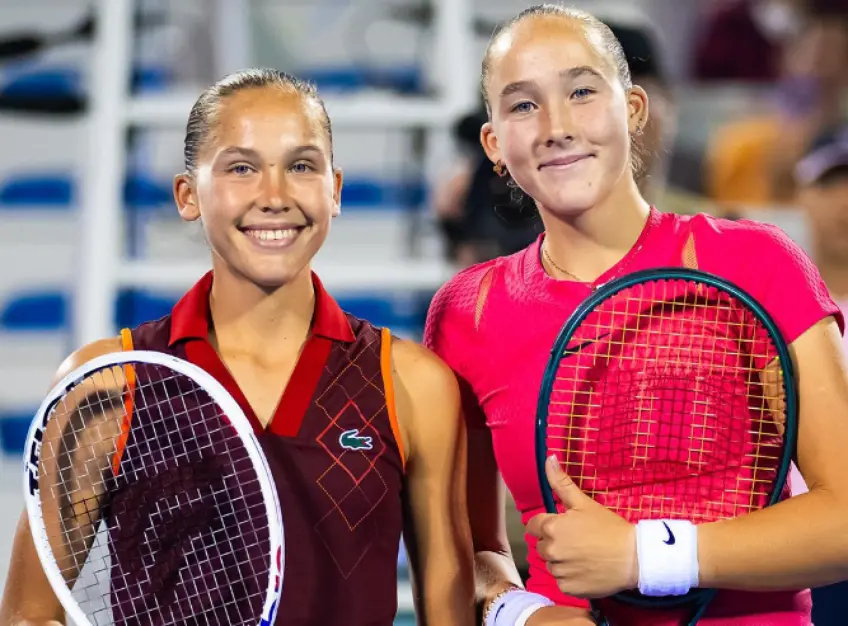
In the heart of Stuttgart’s Porsche Arena, a poignant family drama unfolded on the clay courts of the 2025 Porsche Tennis Grand Prix. Seventeen-year-old Russian prodigy Mirra Andreeva faced her older sister, Erika, in a first-round clash that was as much about sibling bonds as it was about tennis. The match, only their second professional encounter, ended abruptly when Erika, trailing 6-2, 1-0, retired due to a nagging knee injury. Mirra’s heartfelt reflections afterward revealed the emotional complexity of competing against her sister, offering a glimpse into the mental and personal challenges that defined this bittersweet victory.
Mirra, ranked No. 7 in the world, entered Stuttgart riding a wave of success. Fresh off back-to-back WTA 1000 titles in Dubai and Indian Wells, the teenager has emerged as one of tennis’ brightest stars, with a 14-1 record in her last 15 matches. Erika, 20 and ranked No. 97, earned her spot as a lucky loser after Ukraine’s Marta Kostyuk withdrew with an injury. The stage was set for a compelling sibling showdown, but Erika’s heavily strapped right knee, which required a medical timeout early in the match, cast a shadow over the contest. “We share the same room, so of course I knew what she’s been going through,” Mirra said in her on-court interview, her voice tinged with empathy. “Honestly, I have weird emotions. I should be a little bit happy that I won the match, but still I’m super sad it ended like that.”
The match began with Erika striking first, breaking Mirra’s serve in the opening game. But Mirra, showcasing the aggressive baseline game that toppled Aryna Sabalenka and Iga Swiatek en route to Indian Wells, quickly seized control. She won 94% of her first-serve points and converted all three break-point opportunities, claiming the first set 6-2 in just over 30 minutes. Erika, hampered by her injury, struggled to keep pace, retiring after Mirra took a 1-0 lead in the second set. The sisters shared a tender embrace at the net, a moment that moved the Stuttgart crowd. “If she wouldn’t start playing tennis before me, I don’t think I would play that well this fast,” Mirra later said, crediting Erika’s trailblazing path. “She showed me the way.”
Their history adds depth to the narrative. Erika dominated their lone prior professional meeting in Wuhan in 2024, winning 6-3, 6-1, and claimed victory in every childhood practice set. “I actually haven’t [beaten her],” Mirra admitted with a laugh at the 2024 US Open, recalling Erika’s 6-1 or 6-2 routs when they were younger. In Stuttgart, Mirra flipped the script, but the victory came at a cost. “For me, 75%-80% is about my mental preparation,” she told reporters, explaining the unique challenge of facing her sister. “You’re not just focusing on how to beat her, but you’re also wondering, does she feel good? What are we going to do after the match? To really just focus on myself, it’s almost impossible when I play against her.”
Mirra’s candor extended beyond the match. With a playful glint, she turned the post-match interview into a celebration, leading the crowd in singing “Happy Birthday” to her coach, Conchita Martínez, whom she cheekily addressed by her full name, Concepción. The lighthearted moment contrasted with her deeper reflections on Erika’s influence. “Because of her, it was easier for me to start playing bigger tournaments right away,” Mirra said, acknowledging how Erika’s early forays into professional tennis paved the way for her own rapid rise.
The Stuttgart Open, a WTA 500 event, is renowned for its prestige and unique prize—a Porsche for the champion. Mirra, who doesn’t yet have a driver’s license, admitted to eyeing the cars on offer. “I already thought about which cars I would like to get,” she said before the tournament, though she added, “We’re going to decide if I get to the final.” Her next challenge is a second-round clash with fellow Russian Ekaterina Alexandrova, as she aims to capitalize on the absence of defending champion Elena Rybakina and other top players like Zheng Qinwen and Ons Jabeur.
Mirra’s journey in Stuttgart is about more than titles or trophies—it’s a testament to the unbreakable bond with her sister. As Erika recovers, Mirra carries forward with gratitude and determination, her “weird emotions” a reminder that even in victory, family comes first.
Leave a Reply